June 10, 2015 | 20th Anniversary Conference
Celebrating 20 Years of Promoting Women's Leadership and Voices
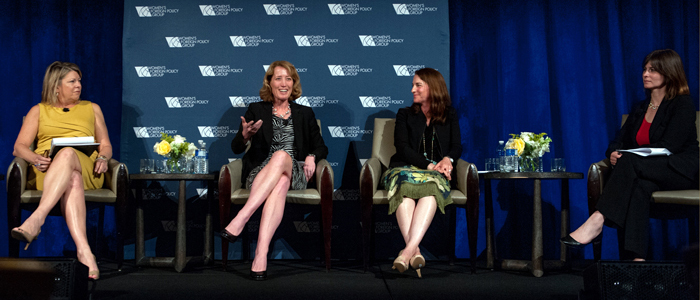
Washington, DC—“20 New Ideas to Meet Tomorrow’s Global Challenges” featured Shari Bryan, vice president of the National Democratic Institute for International Affairs, Bathsheba Crocker, assistant secretary for international organization affairs, and Kristin Lord, president and CEO of IREX, and was moderated by Coral Davenport, energy and environment correspondent of The New York Times. The speakers considered major current and continuing global challenges and presented ideas on how to solve those problems. Touching upon a diverse range of contemporary issues, including youth, urbanization, climate change, technology, and the United Nations, the panel presented the common themes of resolving conflict without violence and addressing economic inequality.
The speakers all identified critical opportunities in promoting global stability. Stating that there are 1.2 billion people aged 15 to 24 in the world today, of which 87% reside in developing countries, Kristin Lord discussed that although the “youth bulge” is associated with social marginalization, political violence, terrorism and criminality, it is also an opportunity, as the youth population will have a profound effect on regions such as the Middle East and Africa. She encouraged more youth engagement around the world in order to ensure that there is a youth boom in the future, rather than a youth bulge. For instance, while a significant amount of attention and money has been given to younger children, fewer resources are allocated towards teenagers and young adults. Lord suggested that governments and organizations should incorporate a youth focus or youth inclusion initiatives into current investments and programs, and start investing in education and workforce development. By focusing on youth today, governments and organizations have the opportunity to avoid potential insecurity and conflict associated with marginalized young people in the future.
On the issue of reshaping the relationship between people and their governments, Shari Bryan identified urbanization as a major source of political and economic opportunity. Stating that more than 80% of the world’s GDP is generated from cities, and as megacities are beginning to develop their own foreign policy networks, Bryan noted that tremendous leadership will be needed in order to manage such large-scale projects and fully harness the opportunities that cities offer. Bryan also argued that technology is an important instrument in encouraging democracy. Although admitting that some governments do use technology to repress their citizens, Bryan reminded the audience that there is a huge increase in the amount of available data in the world, and how it is easier to communicate with political leaders and hold individuals accountable. Bryan asserted that not only has political accountability increased, but technology has also changed the way in which people engage in politics. She maintained that electing more women into positions of power would create measurable impact. Bryan mentioned that more women in decision-making positions would mean focusing more on development and economic equality.
Moderator Coral Davenport raised the question of climate change as a source of insecurity for the 21st century. According to Davenport, the problem of climate change will affect where and how people live, what they fight over, and the future of public health. The International Organization for Migration, she added, has estimated that emergencies caused by climate change could “trigger a wave of up to a billion new refugees by 2050”. To counter such crises, Davenport stressed that it is crucial to find ways to decouple fossil fuel emissions from continued economic growth.
Assistant Secretary Bathsheba Crocker discussed the role of the United Nations in addressing global needs and questioned whether the UN was equipped to tackle today’s tough issues. Despite encountering difficulties such as the rise of nonstate actors, the daunting crises in the Middle East, and the flouting of international norms by Russia, among other problematic developments, Crocker asserts that the United Nations still brings an unmatched global response and moral authority, and provides a useful framework in tackling a wide variety of topics ranging from security to gender and economic equality. Crocker reminded the audience that the United Nations has been involved in a myriad of day-to-day activities that may not be visible to the general public and plays a crucial role in upholding global peace and security. Moreover, there has even been a renewed energy across the international system in working towards a multilateral solution. Crocker notes, for instance, that there has been considerable determination among countries to reach a real climate change agreement by the end of 2015.
When asked about the role of the United States in meeting the issues raised by the speakers, the panel reflected on the importance of influencing good governance around the world, finding solutions to conflicts before they erupt violently, and the limits of the powers of the US government. Lord stated that private organizations, non-profit organizations, and civil society networks are crucial to creating social inclusion and economic opportunities, while Bryan added that advocacy organizations are needed to remind elected leaders that, for example, matters involving youth and women can be engines for economic growth. Bryan also said that a number of cities and local governments are beginning to address global challenges, such as taking steps to curb emissions. Crocker discussed how the United Nations is becoming more involved in “political missions”, which try to broker between disputing parties before conflict breaks out, and is also participating in missions that range from serving as gender advisors to civilian police. Crocker contended that it is important to work as a global community because the US does not have the power to confront economic challenges and peace and governance concerns on its own.
The speakers all addressed career development for young professionals who look to tackle new global challenges. All of the panelists agreed that one should be open to different kinds of experiences rather than being wed to one career plan and stressed the importance of networking. Lord added that people should also be open to creating their own job based on the need they see in an organization, and discouraged people from pursing a position simply because of the name of the organization. Bryan urged young people interested in foreign affairs to work abroad, stating that living overseas will change lives and the way people approach tasks as professionals.
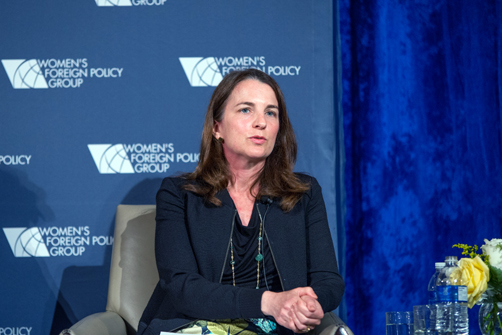 |
 |
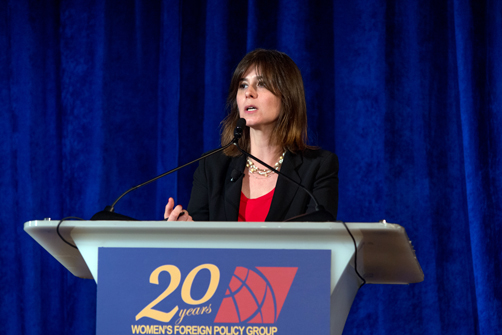 |
Bathsheba Crocker, Assistant Secretary of State for
International Organization Affairs
|
|
Moderator Coral Davenport, The New York Times Energy
and Environment Correspondent, gives
opening remarks
|
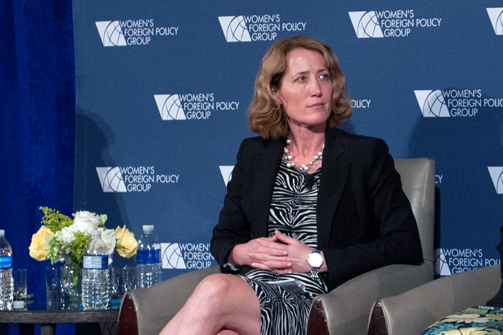 |
 |
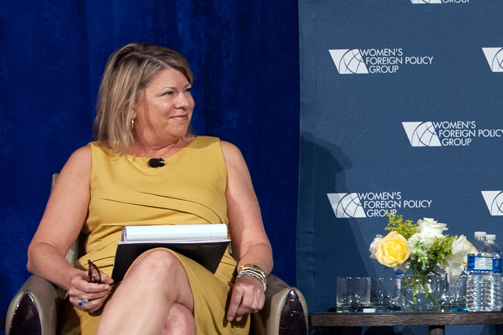 |
Kristin Lord, President and CEO of IREX
|
|
Shari Bryan, Vice President of the
National Democratic Institute for International Affairs
|
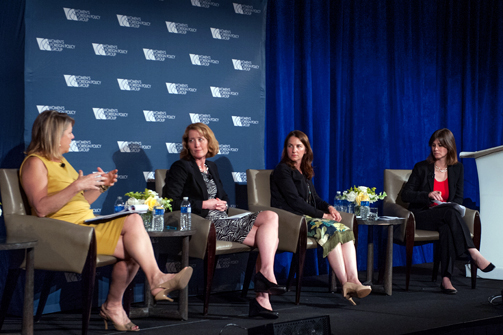 |
 |
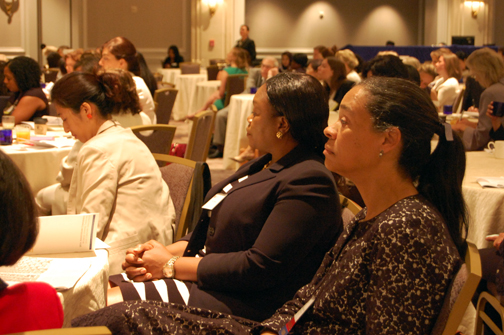 |
Panelists discuss current and future global challenges
|
|
Board Member Gail Leftwich Kitch and
audience members during the panel
|
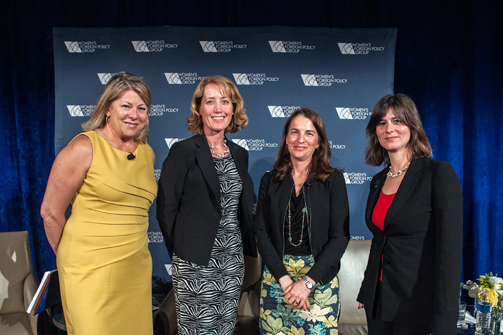 |
 |
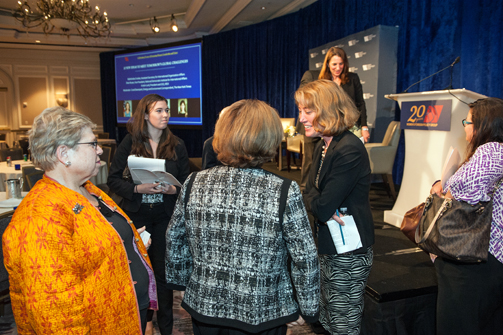 |
Panelists with moderator Coral Davenport
|
|
WFPG members and guests speak to
panelists after the discussion
|
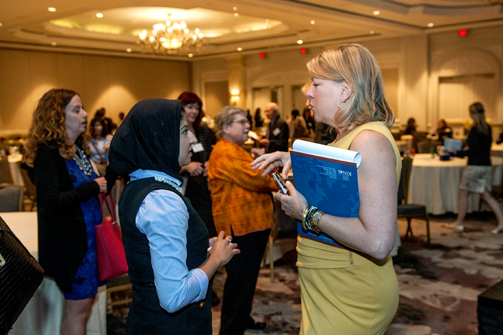 |
 |
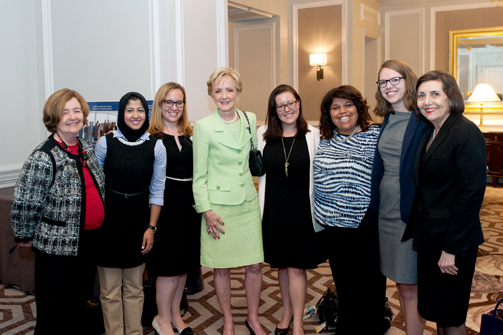 |
Future Leaders of the Department of State meet panelists
|
|
WFPG Board Members Dawn Calabia, Ann Stock, and
WFPG President Patricia Ellis with guests after
the end of the event
|